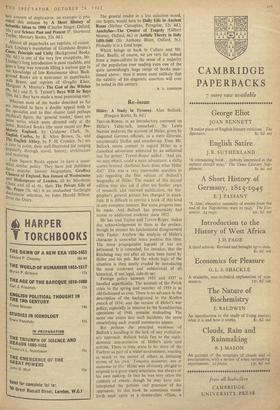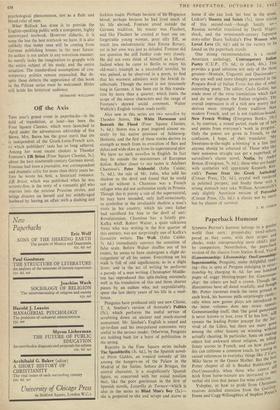Re-issue
Hitler: A Study in Tyranny. Alan Bullock. (Penguin Books, 8s. 6d.) TREVOR-ROPER, in an introductory comment on Hitler's Table-talk, remarked : 'Sir Lewis Namier endorses the account of Hitler, given by disgusted German officials, as a mere illiterate, unsystematic bluffer and smasher-up. Even Mr. Bullock seems content to regard Hitler as a diabolical adventurer animated by an unlimited lust for power.' Trevor-Roper added : 'And yet, we may object, could a mere adventurer, a shifty scatter-brained charlatan have done what Hitler did?' This was a very reasonable question to ask regarding the first edition of Bullock's biography of Hitler. The reader of this second edition may also ask if after ten further years of research, and renewed publice.tion, the bio- grapher's general picture has changed in essen- tials. It is difficult to rewrite a book of this kind in any complete manner. But some progress may be made. And Bullock has presumably had access to additional evidence since 1952.
He has read Taylor and Trevor-Roper, makes due acknowledgement to them in the preface, though he stresses his fundamental disagreement with Taylor. Anyhow the analysis of Hitler's character is somewhat more positive this time. The more propagandist legends of war are jettisoned. It is conceded, for instance, that the Reichstag may not after all have been burnt by Hitler and his pals. But the whole logic of the situation is then neatly evaded by introducing the most irrelevant and unhistorical of all historical, if not legal, culs-de-sac.
Foreign policy between 1933 and 1937 is handled superficially. The account of the Polish crisis in the spring and summer of 1939 is as old-fashioned as ever. There is no advance in the description of the background to the Roehm putsch of 1934; and the version of Hitler's war policy, especially in relation to he Scandinavian operations of 1940. remains misleading The more one enters into such incidents, the more unsatisfying such overall summaries appear.
But perhaps the principal weakness of Bullock's handling is the lack of any evolution- ary approach. Bullock holds fast to the static, demonic interpretation of Hitler's aims and actions. There is little sense in his story of the Fuehrer as part of a wider environment, reacting as much to the moves of others as initiating moves of his own. 'Tempora matantur, no et nrutamur in INA.' Hitler was obviously obliged to respond to a great many situations, not always of his own making. In fact he was very often the creature of events, though he may have mis- interpreted the policies and practices of his opponents. In this book he sometimes stands forth once again as a drama-class villain, a
psychological phenomenon, not as a flesh and blood ruler of men.
What Bullock has done is to provide the English-speaking public with a competent, highly stereotyped textbook. However didactic, it is none the less the best textbook we have. It is also unlikely that better ones will be coming from German publishing houses in the near future. Its author is not unfair in any notorious manner; he merely lacks the imagination to grapple with the entire subject of his study, and the entire situation. The standardised assumptions of con- temporary politics remain unassailed. But de- spite these defects the appearance of this book in the Pelican series must be welcomed. Hitler still holds his historical audience.
DESMOND WILLIAMS















































 Previous page
Previous page